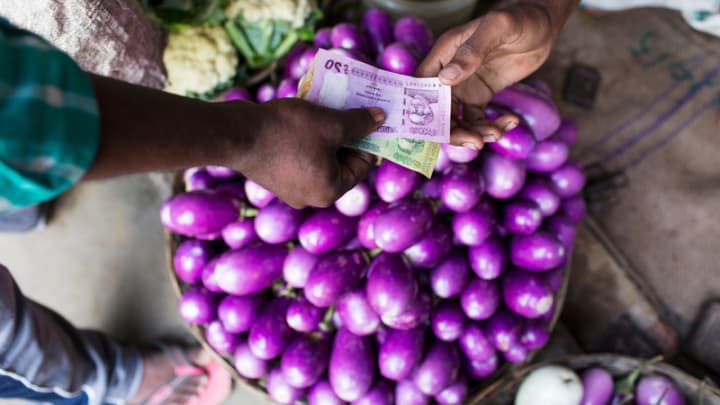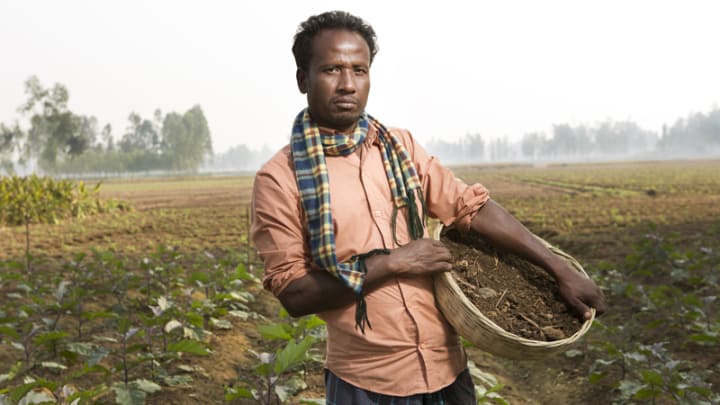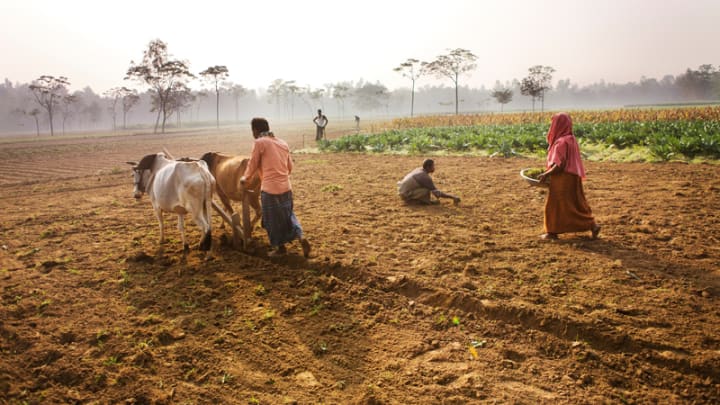
The eggplant, known in Asia as brinjal, is one of the most inexpensive and popular vegetable crops grown in Bangladesh, ranked only below the potato and onion in terms of total production. It is a major source of income for around 8 million smallholder farmers, and a mainstay in the diet of the nation’s 160 million people. However, the crop is constantly under threat from the fruit and shoot borer — a moth species whose larvae burrow into the eggplant, destroying it from within. If not controlled, the pest can damage up to 100 percent of a field of eggplants and threaten the smallholder farms that depend on it.
On his farm in northern Bangladesh, Anisur Rahman Sheikh told us that he has been growing brinjal for 10 years. While it’s not a difficult crop to grow, he said the impact of the fruit and shoot borer can be disastrous for eggplant farmers.
“Two years ago, 50 percent of my crop was lost to the borer,” he recounted. “I lost a lot of money and seriously considered giving up the crop altogether.”

Given the social and nutritional importance of the eggplant, public and private sector scientists and farmers have pooled their expertise to find both economically sustainable and environmentally friendly ways to tackle the pest.
Rahman Sheikh recently planted biotech eggplant for the first time. The biotech variety (Bt eggplant) repels or kills the fruit and shoot borer, and Rahman Sheikh is confident that it will make a difference for him and his family.
“Already, the plants look stronger and healthier,” he said. “I won’t know until the harvest, but the plants look good. I am expecting a good harvest with no losses.”
In fact, the Bt eggplant has shown close to 100 percent effectiveness in controlling pests. Not only have farmers’ incomes risen through increased yields, but the crop requires far fewer insecticide applications to reduce pests that threaten it.

Rahman Sheikh explained that a good harvest will have a significant impact on his life.
“You see, my house is still not complete,” he said. “So if I get more crops, I get more profit and I can repair my house and I can contribute to my kids’ education, their health, and their safety.”
We visited plant scientist Hasan Tanbir from the Bangladesh Agricultural Research Institute, the country’s public research body that helped bring the Bt eggplant to Bangladesh. BARI has been distributing saplings to farmers, and providing training on good stewardship and best practices. In a country where agriculture is so important to the economy, he said the adoption of new technology is vital.

“Over 90 percent of Bangladeshi people work in agriculture, and food security is very important to our country,” said Tanbir. “Farmers were becoming afraid to grow brinjal. But with the Bt gene inserted to fight the borer, farmers can be successful with an important crop. It is essential for these farmers.”
The insect-resistant Bt eggplant in Bangladesh was facilitated by the Agricultural Biotechnology Support Project II, funded by the United States Agency for International Development and led by Cornell University in very close collaboration with BARI. The project’s goal is to commercialize biotech crops to complement conventional agricultural approaches to help alleviate poverty, reduce hunger and boost food and nutrition security. The Bt eggplant was commercialized in Bangladesh in 2013.
Initially developed in the private sector, the Cry1-Ac protein produced in the Bt eggplant — and which repels the borer — is similar in structure to that found in nature, and is used commercially in the form of Bt-based biopesticides, often used by organic growers. Through a creative partnership and licensing agreement between private and public actors, the Bt eggplant is available to farmers who can most benefit, with no additional technology fees or royalties payable. In addition, farmers will not only be permitted, but actively encouraged, to save their seeds.
Just like the biotech sorghum plant that can tackle blindness, the Bt eggplant is another compelling example of how public and private sector expertise can pull together to meet huge global challenges such as hunger, malnutrition and poverty. By harnessing our collective strengths, including research and development, manpower, resources and facilities, huge progress can be made.
We are looking for more farmer and scientist Food Heroes, like Hasan Tanbir and Anisur Rahman Sheikh, to tell their story. Help us uncover the men and women that are securing food supplies for future generations so we can share their story. Submit your Food Heroes’ stories or your own story here.
Read more from Croplife
The sorghum plant that could tackle blindness
Scientists in Kenya have taken a staple crop, sorghum, and enhanced its Vitamin A content to help fight chronic nutritional deficiencies that cause hundreds of thousands of children to go blind every year.
